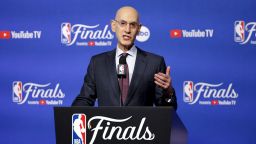Politics
NCAA Faces Deadline on Controversial Gambling Rule Change

As allegations of sports gambling continue to emerge within Major League Baseball (MLB), the NBA, and college basketball, the NCAA is preparing to make a pivotal decision on a proposed rule change. The organization has until 5 p.m. ET on November 21, 2023, to determine whether to allow college athletes and staff to engage in betting on professional sports.
Many within the college athletics community remain skeptical about this change. A coach who requested anonymity expressed doubt, stating, “There’s no way that happens, right?” To block the proposal, however, two-thirds of the Division I member schools must submit paperwork by the deadline. Currently, a source has informed CNN that “as of right now, we are not meeting that threshold.” If 241 out of 361 Division I schools do not respond, the rule will automatically take effect on November 22, 2023.
Historically, college athletes, coaches, and staff have faced strict prohibitions against wagering on any sport where the NCAA holds a championship. While betting on horse racing was permitted, involvement in gambling related to baseball, football, basketball, or hockey was not allowed. The NCAA argues that with the growing legality of sports betting across various states and its accessibility to college students, maintaining the ban on professional sports betting no longer reflects the current landscape.
Betting on college sports will continue to be prohibited under the proposed change. In a statement, Roberta Page, director of athletics at Slippery Rock University and chair of the Division II Management Council, emphasized that the change accounts for the realities of today’s sports environment while maintaining a commitment to the integrity of college competition and the welfare of student-athletes.
Initially, the rule change was set to go into effect on November 1. However, the timing coincided with the unsealing of an indictment that detailed two separate sports gambling schemes involving rigged poker games and point shaving. This scandal implicated members of three New York crime families, two NBA players, and an NBA head coach. In light of these serious allegations, Greg Sankey, commissioner of the Southeastern Conference, urged NCAA President Charlie Baker to reconsider the proposal. In a letter obtained by ESPN, he wrote, “On behalf of our universities, I write to urge action by the NCAA Division I Board of Directors to rescind this change and reaffirm the Association’s commitment to maintaining strong standards that keep college participants separated from sports wagering at every level.”
Three days later, the NCAA announced a delay in its decision, though it clarified that the postponement was not due to public backlash. Instead, it was triggered by a lack of sufficient support, as less than 75 percent of cabinet members voted in favor of the change, leading to an automatic 30-day rescission process.
It is noteworthy that despite the commissioner’s objections, both cabinet members representing the SEC—Jeremiah Donati, athletic director at South Carolina, and Matt Boyer, SEC assistant commissioner for compliance—voted in support of the proposal according to the NCAA committee’s report. Among the eight representatives from the four power conferences, the votes varied: both representatives from the Atlantic Coast Conference opposed the proposal, while the Big Ten and SEC supported it, and the Big 12 split its vote.
Since the beginning of the rescission period, the sports landscape has continued to be rocked by scandals. Two MLB pitchers have been indicted for their roles in game rigging, and six college basketball players from three different institutions have received permanent bans from NCAA competition due to game-fixing activities. Furthermore, the New Jersey Attorney General’s office recently announced charges against 14 individuals, including student-athletes, for their involvement in an illegal online sports betting scheme connected to members of the Lucchese crime family.
As the NCAA approaches its decision deadline, the outcomes of these developments could have significant implications for the future of college athletics and its relationship with the expanding world of sports gambling.
-

 Top Stories3 weeks ago
Top Stories3 weeks agoMarc Buoniconti’s Legacy: 40 Years Later, Lives Transformed
-

 Business2 weeks ago
Business2 weeks agoForeign Inflows into Japan Stocks Surge to ¥1.34 Trillion
-

 Health3 weeks ago
Health3 weeks agoInnovative Surgery Restores Confidence for Breast Cancer Patients
-

 Sports1 month ago
Sports1 month agoSteve Kerr Supports Jonathan Kuminga After Ejection in Preseason Game
-

 Top Stories3 weeks ago
Top Stories3 weeks agoBOYNEXTDOOR’s Jaehyun Faces Backlash Amid BTS-TWICE Controversy
-

 Science1 month ago
Science1 month agoChicago’s Viral ‘Rat Hole’ Likely Created by Squirrel, Study Reveals
-

 Science2 weeks ago
Science2 weeks agoUniversity of Hawaiʻi Joins $25.6M AI Project to Monitor Disasters
-

 Entertainment1 month ago
Entertainment1 month agoZoe Saldana Advocates for James Cameron’s Avatar Documentary
-

 Lifestyle1 month ago
Lifestyle1 month agoKelsea Ballerini Launches ‘Burn the Baggage’ Candle with Ranger Station
-

 Politics1 month ago
Politics1 month agoDallin H. Oaks Assumes Leadership of Latter-day Saints Church
-

 Lifestyle1 month ago
Lifestyle1 month agoDua Lipa Celebrates Passing GCSE Spanish During World Tour
-

 Business1 month ago
Business1 month agoTyler Technologies Set to Reveal Q3 2025 Earnings on October 22









